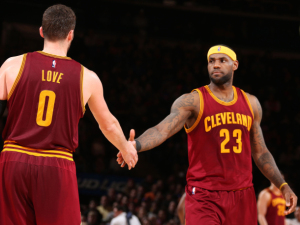By NEIL PAINE
Cleveland Cavaliers forward Kevin Love made news Monday when he endorsed Russell Westbrook of the Oklahoma City Thunder in the NBA MVP race. Now, normally that wouldn’t be much of a story — we’ve made the case for Westbrook ourselves — except for one not-so-tiny detail: Love picked Westbrook over his own teammate, LeBron James.
Asked to choose between Westbrook (Love’s old college teammate at UCLA) and James by Dan Patrick on his eponymous radio show, Love said:
They’re both having an MVP-type season, but I’m going to go with Russell Westbrook because … every single night you’re looking at his stat sheet, they’re fighting for a playoff spot, with Serge Ibaka going down now, Kevin Durant potentially being out the rest of the year and him still going out there and fighting for his team, and winning, and fighting for that seventh or eighth spot in the playoffs. … I think Russ is arguably having the better season.
The supposed slight between teammates was later downplayed by James (“Kevin has his own opinion of who he believes is the MVP. No one should fault him for that.”). But to some, it added to the speculation about a growing rift between the two superstars — and what it could mean for Love’s future in Cleveland. If he chooses to, Love can opt out of his contract and become a free agent this summer.
Then again, maybe Love was just following the same rubric that MVP voters have adhered to for over a half-century. Several years ago, Justin Kubatko (then of Basketball-Reference.com) analyzed historical patterns in NBA MVP voting, attempting to create an algorithm that would predict the front-runners for the award in-season. After going through a variety of statistical combinations, he found that four categories had by far the most influence on MVP results: team wins, points per game, rebounds per game and assists per game.
That research forms the basis for Basketball-Reference.com’s MVP trackertool, which currently gives Westbrook about twice as good a shot at the award as James. While James’ team has been better, winning 64 percent of its games — compared with 58 percent for Oklahoma City — Westbrook’s edges over James in points, rebounds and assists per game are traditionally more than enough to offset the difference in team records. The Thunder’s winning percentage would have to drop to 48 percent for Westbrook and James to have the same MVP probability per the Basketball-Reference.com model.
(For what it’s worth, the metric also lists Houston’s James Harden and — especially — Golden State’s Stephen Curry as overwhelming MVP favorites, with Curry garnering a 41 percent probability of taking home the hardware. So it’s still unlikely that Westbrook or James will win the award.)
In other words, Love isn’t necessarily going out of his way to disrespect James here. Perhaps the homer pick — publicly backing one’s teammate despite evidence to the contrary — is still a customary gesture of solidarity among colleagues. But by picking Westbrook instead, Love was at least highly consistent with the way media members have voted for players since the first MVP was handed out.

